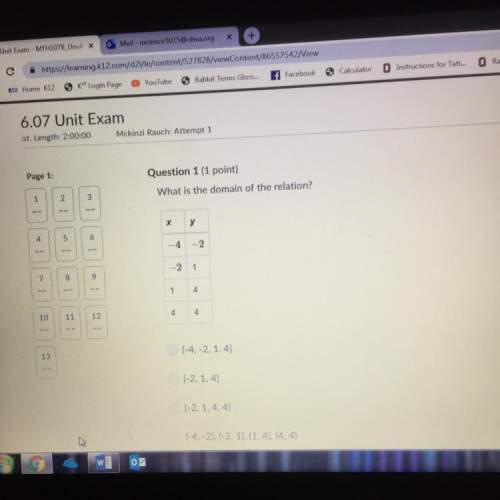
Mathematics, 30.07.2019 18:10, mikkilynnpeace1982
For each of the following sequences and "volumes, " decide whether the knapsack problem is superincreasing and how many solutions (if any) it has: (a) {2, 3, 7, 20, 35, 69}, v = 45: (b) {1, 2, 5, 9, 20, 49}, v = 73: (c) {1, 3, 7, 12, 22, 45}, v = 67: (d) {2, 3, 6, 11, 21, 40}, v = 39: (e) {4, 5, 10, 30, 50, 101}, v = 186: (f) {3, 5, 8, 15, 28, 60}, v = 43: the knapsack problem. given a set {v_i} of k positive integers and an integer v, find a k-bit integer n = (epsilon_k - 1 epsilon_k - 2 .. epsilon_1 epsilon_0)_2 (where the epsilon_i elementof {0, 1} are the binary digits of n) such sigma^k - 1_i = 0 epsilon_i v_i = v, if such an n exists. note that there may be no solution n or many solutions, or there might be a unique solution, depending on the k-tuple {v_i} and the integer v. a special case of the knapsack problem is the superincreasing knapsack problem. this is the case when the v_i, arranged in increasing order, have the property that each one is greater than the sum of all of the earlier v_i.

Answers: 1
Similar questions

Physics, 22.06.2019 18:30, winterblanco
Answers: 1

Physics, 19.07.2019 13:40, hailey200127
Answers: 1

Chemistry, 16.10.2019 16:30, badaxz
Answers: 1

Computers and Technology, 01.11.2019 02:31, shoafmckenzie1962
Answers: 1
Do you know the correct answer?
For each of the following sequences and "volumes, " decide whether the knapsack problem is superincr...
Questions in other subjects:



Mathematics, 08.11.2019 07:31













